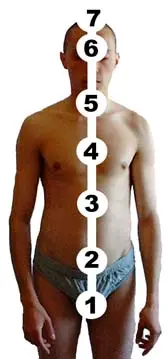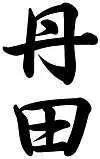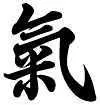|
Qi Energy Exercises
|
Qi Centering Exercises Find the center of your qi energy flowIf you managed the previous exercises, you should by now have established a good posture, breathing, relaxation, and a fine flow of qi. So, now it is time to return to the very base of it all – the point that is the center of the life energy flow.
Of course, this center is involved in all the previous exercises, but I still believe that the proper order of introduction into these aspects is the one given in this book. Only after you have familiarized yourself with how to work on your posture, breathing, relaxation, and qi extension, is it time to concentrate on your center, although it is the most fundamental of all. The reason for this order is that your perception of your center is far too vague, before you have commenced your flows. When you can feel your qi stream through and out of the body, then you can sense the center in which those flows have their origin. Beforehand, it would just make you confused if you tried to establish a sense of center. Actually, in the Eastern perspective the center is far more than just a junction of your body’s qi flows. It is the physical answer to the question: who am I? I am here, precisely in my center, a point of infinite exactness. From this precise point I act, and to this point I receive. Man’s central station, if you like.
But this point in your lower abdomen is not the only possible center in your body. It is not that simple at all. There are seven points, which are usually counted from the bottom of the torso up to the top of the head:
We do not need to make it that cryptic. The seven chakras are spread through the body, but still connected, sort of like the ‘connect the dots’ drawings for children. But the figure that the chakras make when connected is the simplest one imaginable – a straight vertical line through the middle of the body. There are illustrations that place the seven chakras here and there in the body, so that a line drawn through them would be a curve, slithering like a mountain road. That is not how I see it. The line is straight, running vertically through the body, and constitutes its fundamental pillar. The pillar of being. A tree of life, if you will, from which man’s body and actions emerge like the branches of a tree. This pillar is a mighty thing to get acquainted with. Qi should flow freely and forcefully through this pillar and all the seven chakras, when you have succeeded in opening yourself up properly. Then you become as stately as a temple. It is beyond the scope of these exercises to go through all the seven chakras, their meanings and applications at depth. We settle with the chakra that the Eastern tradition regards as the basis for powerful qi breathing – the second one from the bottom, a couple of inches below the navel. But when you have learned to activate this point, you will discover that the other ones allow themselves to be awakened and developed, without too much trouble. That is how they are connected through the central line. If one point is stimulated, it makes the other ones come alive as well.
Rice is the basic food for the Chinese and the Japanese. Since ancient times it has been the most important requirement for their survival. Rice brings power to their bodies, so a rice field represents a vast resource to promote and preserve life. This is the connection that explains why the sign for a rice field is used to describe the chakra we focus on.
Thereby it is obvious that the chakra we have chosen is particularly connected to qi. It is the source of the great flow of glowing life force. This also means that stimulating the qi flow automatically leads to stimulation of this chakra in particular. Naturally, this is mutual. Concentrating on this chakra in your body will lead to an enhanced qi flow. In the beginning it is difficult to feel one’s center clearly, therefore also to work with it. But this is true also for qi breathing, which is still stimulated by the previous exercises, without too much trouble. So, the same exercises are also good for increasing your perception of the second chakra. This is particularly true for the following exercises:
So, how should your center feel? It is a point, infinitely exact, and therefore without any physical extension. But at the same time it sort of vibrates with potential, a force that can be brought forward. Maybe it should be compared to the black holes in space, containing so much in their formidable density that light itself is bent and swallowed by them. But your center can both swallow and erupt – with the same magnificence. So, a strong sense of your center is of a point inside your body, which is of ghastly significance and makes its surroundings shudder by all that it is able to take and give. The actual center is like a black hole, the core of which cannot be perceived, but its surroundings are struck by a kind of trembling vibration, tickle or itch. That is what reveals the existence and potential of your center. It seems almost unpleasant, as described above, but it still is both tempting and stimulating. It brings a feeling of immense ability and mystic grandeur that you will enjoy in spite of that odd itch.
Qi Centering ExercisesHere is a set of simple exercises to find the center of your qi flow. That makes you grounded and your qi flow powerful. You don't really have to follow the order given below, but you may want to do so the first time around. Then you can focus on the ones you find particularly rewarding.
Qi Energy Exercises
Qi Exercise Settings
Qi Energy Breathing
Qi Posture
Qi Relaxation
Qi Extension
Qi Centering
The Book
My Books About Life EnergyHere are the two books I have written on the subject of life energy. This website contains some of the material from the first one. Click the image to see the book at Amazon (paid link).
About CookiesMy Other WebsitesLife EnergyThe many life force beliefs all over the world, ancient and modern, explained.
TaoisticTaoism, the old Chinese philosophy of life, based on Tao, the Way. Also, the complete Tao Te Ching translated and explained.
AikidoAikido, the peaceful martial art. Its basics, principles, techniques, and more — in texts, images and videos.
I Ching OnlineThe 64 hexagrams of the Chinese classic I Ching and what they mean in divination. Free online reading.
Other Books by MeClick the image to see the book at Amazon (paid link).

Stefan StenuddAbout Me I'm a Swedish author and aikido instructor. I've written several books about aikido, qi energy and other life force concepts. I'm also an historian of ideas, researching the thought patterns in creation myths. Click the image to get to my personal website. Contact
|
 Qi — Increase Your Life Energy
Qi — Increase Your Life Energy The previous exercises have shown clearly that this center is inside your belly, to be more precise a couple of inches below your navel – usually it is specified as three finger widths below the navel. It is with this point you should breathe, in order to commence a significant qi flow. So, it can be described as a center of power.
The previous exercises have shown clearly that this center is inside your belly, to be more precise a couple of inches below your navel – usually it is specified as three finger widths below the navel. It is with this point you should breathe, in order to commence a significant qi flow. So, it can be described as a center of power.
 The second chakra is called dantian in Chinese, and tanden in Japanese. It is written with two pictograms. One of them means cinnabar red, and the other means rice field – so, the cinnabar red rice field. The red color is intense, like blood and fire. That the red color is linked to energy and life is no mystery – but what about the rice field?
The second chakra is called dantian in Chinese, and tanden in Japanese. It is written with two pictograms. One of them means cinnabar red, and the other means rice field – so, the cinnabar red rice field. The red color is intense, like blood and fire. That the red color is linked to energy and life is no mystery – but what about the rice field? Another connection to rice is found in the sign for qi, which has two parts combined into one pictogram – rice and steam. The boiling rice. Here too, rice is used to imply nourishment and an energy needed to sustain life.
Another connection to rice is found in the sign for qi, which has two parts combined into one pictogram – rice and steam. The boiling rice. Here too, rice is used to imply nourishment and an energy needed to sustain life.


